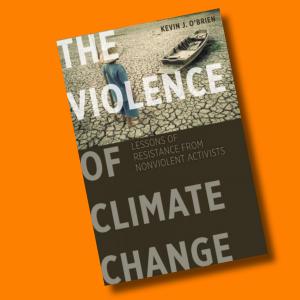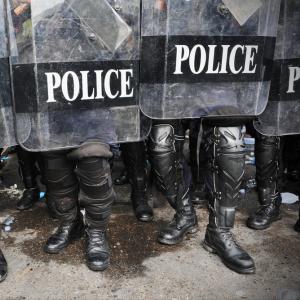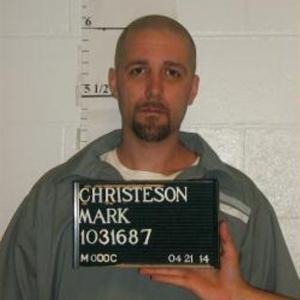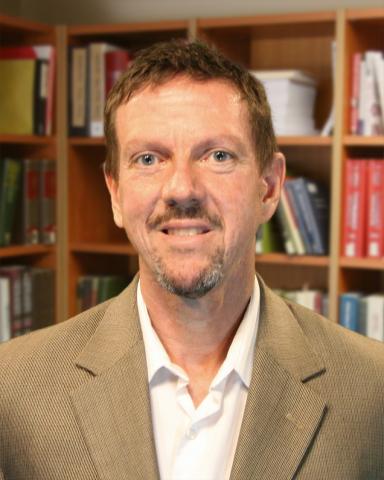
Tobias Winright is a contributing writer for Sojourners, and he holds the Maeder Chair in Health Care Ethics and is teaches theological ethics at Saint Louis University in St. Louis, MO. He recently edited Can War Be Just in the 21st Century? Ethicists Engage the Tradition (Orbis Books, 2015).
Posts By This Author
Tear Gas Is a Chemical Weapon, Not a Deterrence Device
When I was in the police academy, each of us recruits were sprayed point-blank in the face with oleoresin capsicum (OC), a cayenne pepper-based spray. This was done for two reasons: first, this experience would help us to know what it feels like when we use it on someone so that we would use it only when truly necessary; second, in case we ever were sprayed unintentionally, we had to still find our radio or a way to safety. Indeed, I’ll never forget the excruciating burning sensation and excessive mucus that put me out of commission for much of the rest of the day.
Models To Live By
DON'T LET THE prestigious academic publisher put you off: The Violence of Climate Change is engagingly informative as it fuses theory and praxis through the narratives of inspirational nonviolent activists. Nor is it satisfied with the ideal, as it honestly and realistically engages current counterarguments and positions throughout. As such, it’s exceptionally suitable for undergraduates, who are often surprised, then pleased, to discover religion and theology’s relevance for addressing urgent ethical issues.
And what could be more pressing and threatening today than violence—in our city streets and between or within other nations, especially the growing possibility of nuclear war—and climate change? So I hope this book also finds its way to Sunday schools, adult religious education sessions, book club meetings, or pretty much anyone involved in the climate justice movement.
Author Kevin J. O’Brien, dean of humanities and associate professor of Christian ethics at Pacific Lutheran University, defines the problem of climate change as also a problem of structural violence, caused primarily by privileged, powerful nations, corporations, and individuals through simple decisions and complex systems over the generations. Those least responsible are also the most vulnerable and more detrimentally impacted.
'The police are highly militarized.'
THIS TEXT SENT BY a relative at Standing Rock confirms the images we’ve been seeing from the Standing Rock demonstrations against the Dakota Access pipeline in North Dakota. On the evening of Nov. 20, local police with armored vehicles fired at water protectors and their allies with water cannons, tear gas, rubber bullets, and percussion grenades; hundreds were injured and several taken to the hospital.
Once again we are at the crux of legitimate protests, private corporate interest, and the use of police and military force to address the situation. Fall 2011 saw law enforcement dismantling Occupy Wall Street encampments throughout the nation, while various Black Lives Matter demonstrations from Ferguson to Baltimore have faced similar confrontation by law enforcement. In all these cases, law enforcement prioritized protection of private property.
This fall, the Morton County sheriff’s department in North Dakota put its muscle behind the companies building the Dakota Access pipeline. The relationship between the use of force for the establishment of order and corporate interests being represented by the government is a tangled and messy system that has been vividly on display at Standing Rock.
The ongoing militarization of the government’s responses to protests over the past five years raises the question of whether there is a legitimate role for law enforcement, including the National Guard, that does not violate the just war criterion of excessive and disproportionate force.
A number of law enforcement programs and districts are having success through the establishment of de-escalation training and principles in their ranks. By putting in place strategies that de-escalate the need for force, either from the protesters or law enforcement, space is opened for negotiations and resolution.
Military force should in no way, shape, or form be used for the protection of corporate interests, particularly over the well-being of persons. The primary goal of law enforcement in these situations ought to be de-escalation as peacekeeping for the sake of avoiding excessive and disproportionate force and for the protection of the dignity and integrity of all involved.
What Do Pope Francis’ Statements on Nuclear Weapons Mean for Catholics in the Military?

Image via giulio napolitano/Shutterstock
This is where most of us Catholic citizens appear to be, by paying our taxes and going about our lives while our government and our military continue to possess and rely on nuclear weapons. Our Church seems to challenge that we have proportionate reason to do so. For now, we appear to be morally culpable — but less so if we genuinely begin to work toward the elimination of nuclear weapons.
Nuclear Warfare Is Not a Game of Risk

Image via sputnik/Flickr
This is why those Catholics and other Christians who hold that armed force may sometimes be morally justifiable (i.e., just war theory) tend to be "nuclear pacifists” — nuclear war would probably be total war, violating just war principles such as noncombatant immunity and proportionality. And a "first use" to prevent an attack that is not both imminent and grave raises even more red flags.
Missouri Set to Execute Mark Christeson Jan. 31, Fourth U.S. Execution in 2017
As a Catholic moral theologian (and a former corrections officer and reserve police officer), I urge you to stay Mark Christeson’s execution, scheduled for Jan. 31. There are still ongoing federal appeals concerning Christeson’s right to representation by competent and adequately funded counsel.
The Curse of Doing Nothing for Aleppo
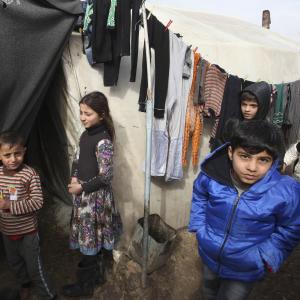
Syrian refugees from Aleppo wait at the refugee camp in Essalame, Syria on Feb. 2, 2016. kafeinkolik / Shutterstock.com
On Dec. 14, Syrian pro-government forces breached the fragile ceasefire agreement, shelling besieged neighborhoods of Aleppo and banning civilians from fleeing. Addressing Syria, Iran, and Russia, the U.S. ambassador to the United Nations, Samantha Power, asked, “Are you incapable of shame? … Is there no execution of a child that gets under your skin? Is there literally nothing that shames you?”
The Military Force at Standing Rock Should Make Us Angry, But Shouldn’t Surprise Us
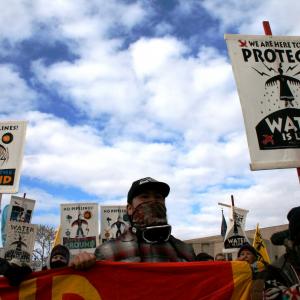
Standing with Standing Rock, Nov. 15. by Leslie Peterson / Flickr.com
“The police are highly militarized.”
This recent text sent by a close relative at Standing Rock confirms the images we’ve been seeing from the #NoDAPL #StandingRock protests against the Dakota Access Pipeline in North Dakota. On the evening of Nov. 20, local police with armored vehicles fired at water protectors and their allies with water cannons, tear gas, rubber bullets, and percussion grenades; hundreds were injured, and several taken to the hospital. Because of the frigid overnight temperatures in the region, medics at the scene were concerned that the use of water cannons would result in severe medical emergencies or even deaths among the members of the encampment.
Learning the Art of Patience

njene / Shutterstock
IN THE MIDDLE OF THE NIGHT on July 23, 2012, I slipped and fell in the bathroom of our hotel room in downtown Indianapolis during a family vacation. My head slammed onto the sink and then the floor.
The noise from my fall awakened my spouse, but when she asked me what happened as I lay on the floor, all I said was, “I’m okay.” Seeing no visible sign of injury, she returned to bed. A stomach bug was making the rounds, so she figured that it must have nabbed me. My vomiting every hour or so the remainder of the night only seemed to confirm this assumption.
At dawn, however, the first words out of my mouth were: “I think I cracked my skull. You’d better take me to the emergency room.” My wife knew something must be wrong, because I never suggest going to the hospital right away. The physician on duty thought I probably had a mild concussion and that I would be able to go home that day, but a CT scan was needed to make sure.
Afterward, he told me that his earlier hoped-for diagnosis was wrong. Instead, I had fractured my skull, with a subarachnoid hemorrhage and a small epidural hematoma under my left frontal region. In other words, I had a traumatic brain injury, and my life was at risk. In fact, I immediately was loaded into an ambulance and taken to a hospital nearby where neurosurgeons would be better able to treat me.
I Was John Howard Yoder's Graduate Assistant. Should I Still Use His Work?
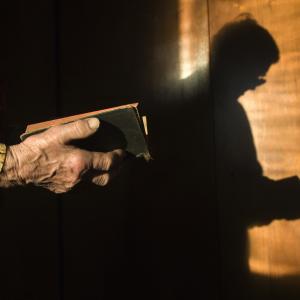
Image via Renata Sedmakova/Shutterstock.com
For me, the question of what to do with Yoder is not only an academic issue but a personal one. I was Yoder’s graduate assistant — and would be his next-to-last — for two years. Academically, how I teach my “War and Peace in the Christian Tradition” course is indebted in great extent to what I learned from him. As evident in numerous footnotes, my scholarship and publications, including for Sojourners, over the last two decades on just war and just policing also owe a lot to both his research and his mentoring.
Nevertheless, after this semester, I am leaning towards Blanton’s recommendation of setting Yoder’s work aside, at least for the foreseeable future. I think it is now possible to rely on the work of others for persuasive defenses of nonviolence and for strong critiques of Niebuhrian realism. I struggled over whether to use one of his books or essays in my course this semester. I hesitated to say anything about Yoder’s misconduct to my students. It took me a while before I did so.
What to do with Yoder? I’m not sure.
The U.S. Is Ignoring Pope Francis' Call to Abolish the Death Penalty
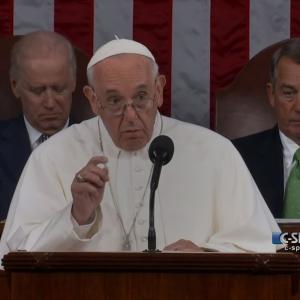
Screenshot via C-SPAN / Youtube
I formerly served as a corrections officer at a maximum security facility. I also used to be a reserve police officer. I have sped through city streets in a squad car, sirens blaring, on my way to shootings. I have booked and interviewed (interrogated) alleged murderers. I have seen victims’ families cry. I have had inmates hit me. I even used force when I wore a badge. And yet, as a Catholic Christian, over the years I have come to oppose capital punishment for a number of reasons.
I agree with Pope Francis’ remarks about the death penalty. During his speech before Congress, Democrats and Republicans applauded when he emphasized: “Let us remember the Golden Rule: ‘Do unto others as you would have them do unto you’” (Mt 7:12). The pope added: “This Rule points us in a clear direction. Let us treat others with the same passion and compassion with which we want to be treated. Let us seek for others the same possibilities which we seek for ourselves. Let us help others to grow, as we would like to be helped ourselves. In a word, if we want security, let us give security; if we want life, let us give life; if we want opportunities, let us provide opportunities. The yardstick we use for others will be the yardstick which time will use for us. The Golden Rule also reminds us of our responsibility to protect and defend human life at every stage of its development.”
A Matter of Degrees
THREE DECADES AGO I did a four-year stint behind bars. I wasn’t incarcerated—I worked as a correctional officer at the maximum security jail for the Pinellas County Sheriff’s Office in Clearwater, Fla. It wasn’t a career I planned on pursuing.
After high school, I couldn’t afford higher education. I earned an associate’s degree from the local community college, working initially at a video game arcade, then at a factory my dad owned. At the time, I was thinking about a career in law, so my mother and stepfather, both of whom were patrol deputies, suggested that I apply for a job at local law enforcement agencies in order to pay my way through school; the sheriff’s department where they worked ended up hiring me. That’s how I earned my bachelor’s degree while working full time as one of the youngest correctional officers at the jail.
During the semesters I worked the night shift at the jail, I took classes during the day; when I worked the day shift, I took night classes. The contrast between the classrooms and the battleship gray corridors lined with steel-barred cells was striking. At the time, I did not like the jail job; I couldn’t wait until I could “escape” to graduate school.
'Demilitarize the Police!'
AS A FORMER reserve police officer who has taught ethics at two police academies, I followed the news very closely after 18-year-old Michael Brown was shot to death by police officer Darren Wilson in nearby Ferguson, Mo. When I saw the military equipment of the St. Louis County Police—especially the sharpshooter on top of an armored vehicle aiming his rifle at the protesters—I said to my wife, “This may turn out to be very, very bad.”
Sen. Claire McCaskill argued in the midst of the protests that St. Louis County should “demilitarize the police response” in Ferguson, telling reporters, “The police response has been part of the problem.”
The militarization of police has been trending over the past few decades. When the thin blue line resembles an occupying force, it exacerbates racial tensions in neighborhoods and communities, making things worse for everyone, including the police.
Some communities are starting to push back. For instance, the city council of Davis, Calif., recently directed its police department to get rid of a mine-resistant, ambush-protected vehicle (worth $700,000) that it had received free from the U.S. military’s surplus program.
Faith and the Executioner
IN THE FOREWORD to Where Justice and Mercy Meet: Catholic Opposition to the Death Penalty, Sister Helen Prejean writes, “Welcome to the pages of this amazing book.” Her hospitable remark is not an exaggeration. I have written articles, taught classes, and spoken to church groups about capital punishment; in my judgment this book is the most accessible resource now available for engaging, informing, and perhaps even transforming how readers view the death penalty.
Where Justice and Mercy Meet was edited by death penalty activist Vicki Schieber, philosopher Trudy D. Conway, and theologian David Matzko McCarthy. The book is the product of two years of interdisciplinary courses, discussions, projects, and research—in sociology, political science, philosophy, economics, theater, ethics, and theology—at Mount Saint Mary’s University in Emmitsburg, Md. While the book has a Catholic focus, it should be useful to Christians of all stripes and others interested in addressing this issue.
The volume is divided into four parts. Through skillful section and chapter introductions and segues, the editors have done a fine job of creating an integrated whole. Relevant questions for discussion and action tips make the book perfect for study groups in churches and for the university classroom.
Part I, “The Death Penalty Today,” exposes the realities of the dominant current method of execution (lethal injection), surveys the history of the death penalty debate in the U.S., and suggests the significance of reading or hearing the stories of those affected by murder and capital punishment. Kurt Blaugher’s chapter, “Stirring Hearts and Minds,” meditates on the role of drama in allowing these stories to capture and broaden our imagination, to stimulate reflection, and to compel us to take action for social change. Indeed, stories—from real life as well as from film and literature—surface throughout the volume, with the most moving and memorable ones being the experiences and voices of those whose loved ones were murdered.
Getting to Green
IN THE FOREWORD to Sacred Acts: How Churches Are Working to Protect Earth's Climate, prolific scholar-activist Bill McKibben recalls a time not long ago when many people of faith regarded environmentalism suspiciously—conservatives saw it as a cover for possible paganism, while liberals considered it less of a priority than problems such as war and poverty. Now, however, theologians and religious leaders discuss the environment almost as much as ecologists and Nobel prize-winning scientists do. As this book shows, moreover, the environmental movement now includes religious organizations such as Earth Ministry, Interfaith Power & Light, and GreenFaith, which are working at the grassroots level in congregations and communities.
Edited by Mallory McDuff, a lay Episcopalian who teaches environmental education at Warren Wilson College near Ashville, N.C., Sacred Acts boldly focuses on climate change. McDuff believes that momentum is building among Christian communities worldwide as they call for just climate solutions—much like a modern Pentecost moment. The book addresses both skeptics and those who know climate change is real but feel overwhelmed by the problem's magnitude and despair of finding and implementing solutions.
The contributors to Sacred Acts include clergy, teachers, activists, directors of nonprofit organizations, and a farmer. Its 12 chapters are divided into four sections on the themes and strategies of stewardship, spirituality, advocacy, and justice.
Gandalf, Gollum, and the Death Penalty
EARLY IN J.R.R. Tolkien's The Fellowship of the Ring, Gandalf the wizard is talking with the hobbit Frodo Baggins about the dreadful Gollum. The frightened Frodo expresses his regret that his uncle Bilbo had not killed "that vile creature, when he had a chance!"
Because of "all those horrible deeds" that Gollum has done, Frodo adds, "He deserves death." Gandalf replies, "Deserves it! I daresay he does. Many that live deserve death. And some that die deserve life. Can you give it to them? Then do not be too eager to deal out death in judgment. For even the very wise cannot see all ends. I have not much hope that Gollum can be cured before he dies, but there is a chance of it."
I do not know where Tolkien stood on the issue of capital punishment, but Gandalf offers theologically relevant points about innocence, guilt, judgment, and hope that Christians should seriously consider as heated debate continues about the morality of this lethal governmental practice.
While a majority of Americans still view capital punishment as morally justified, there is growing opposition to it. Indeed, the number of death sentences dropped to a 35-year low in 2011, and the annual number of executions since 1999, the year in which the most persons were put to death, has with a few exceptions continued to decrease. Seventeen states have abolished capital punishment, including Connecticut, which outlawed the death penalty on April 25, 2012, for any future crimes committed. In 2012, 12 states had active legislation to end it. Why?
Much of the rethinking, even among "law-and-order" conservatives, centers on 1) mistakes that may lead to wrongful convictions and the executions of innocent persons, 2) unfairness in its application, especially in connection with racial and economic biases in society and in the criminal justice system, 3) data that call into question whether capital punishment is an effective deterrent to violent crime, and 4) the high costs for states (and therefore for taxpayers) to implement it (see box on facing page).
While the empirical studies and criminological research are very important, for Christians it is the theological and biblical framework that should ultimately determine our stance on this contentious issue.
Abrahamic Faiths on Peace
EARLIER THIS year, the Interfaith Partnership of metropolitan St. Louis held a public panel presentation addressing three Abrahamic religions—Judaism, Christianity, and Islam—on war and peace. Members of Interfaith Partnership and interested people from the community filled the chapel at Eden Theological Seminary to hear a Jewish scholar, a Muslim academic, and a Christian theologian (me) offer brief presentations on how our respective faith traditions value peace, as well as why, when, and how each religion views the use of violent force as sometimes morally justified.
During the question-and-answer period, I highlighted how in recent years both nonviolent and just war Christians have worked together on an approach, known as just peacemaking, for dealing with the underlying causes of war and thereby preventing its outbreak. As is often the case when I talk on this topic, most persons in the audience seemed unfamiliar with just peacemaking. After I attempted to clarify it further, someone asked the panel if other religious traditions had anything comparable to just peacemaking. The answer is yes, at least for Judaism and Islam, as shown in Interfaith Just Peacemaking, edited by Susan Brooks Thistlethwaite, a theologian and ordained minister in the United Church of Christ.
The 10 proactive practices that have been empirically proven as realistic and effective ways for preventing many wars form the framework for Interfaith Just Peacemaking. They were first identified in Just Peacemaking: The New Paradigm for the Ethics of Peace and War, edited by theological ethicist Glen H. Stassen. That book’s 23 contributors (scholars and practitioners from multiple disciplines—theology, political science, psychology, and history—and from pacifist and just-war perspectives) shared concerns about how just war has devoted insufficient attention to dealing with catalysts that lead to conflict (and not making war truly a last resort) and about how pacifism has failed to offer clear guidance about practical alternatives to war.

